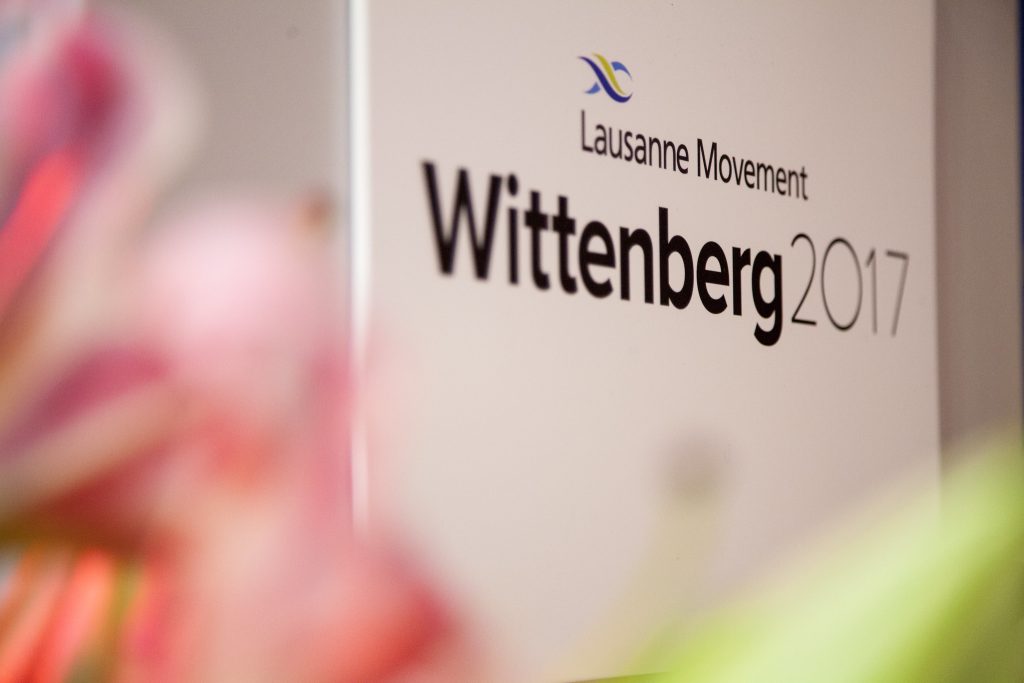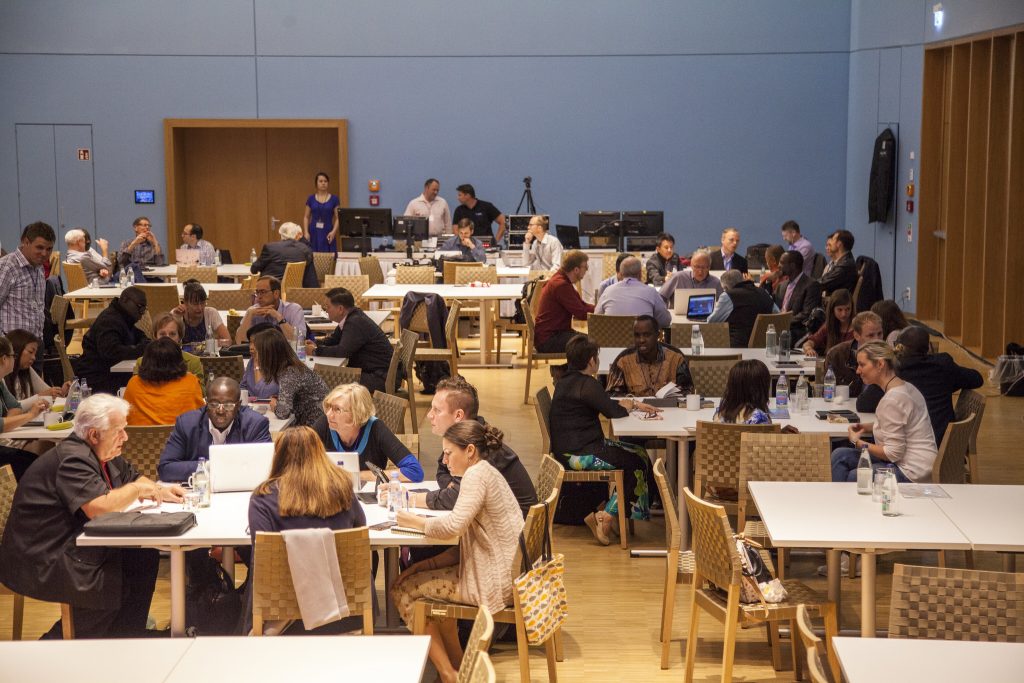Times have changed since the mid-twentieth century, when evangelist, media darling, and founder of the Lausanne Movement Billy Graham reached more than 214 million people through his crusades around the world. Today some Christians have become confused or even cynical about the concept of evangelism, and especially in the West, the word ‘evangelical’ is sometimes tied to political baggage. Has the very role of the evangelist passed away with Billy Graham? What is the place of the evangelist and evangelism in today’s world? Leaders from around the world gathered to address these questions two years ago in Wittenberg, Germany.
On the 500th anniversary of the Reformation, in the very city where Martin Luther once nailed his 95 Theses to the church door, Emmanuel Kwizera joined 90 other hand-selected participants in an unconventional gathering hosted by the Lausanne Movement, one without any planned speakers or predetermined outcomes.

As a senior leader of African Enterprise and the Catalyst for the Lausanne Proclamation Evangelism Network, Kwizera was seated at a table with others who have a similar passion for evangelism. Among those at his table were Raphael Anzenberger from France, Emma Brewster from South Africa, and Kevin Palau of the United States, the son of evangelist Luis Palau. As the current president of the Luis Palau Association, Palau has helped coordinate hundreds of citywide evangelism campaigns on five continents.
‘It was my first time meeting Kevin. I knew the Luis Palau organization, they had come to Africa and done some events, but we had never had any formal conversations before,’ recalls Kwizera. ‘At the table, we began to talk about what was needed in evangelism globally.’
Kwizera emphasizes the novelty of those Wittenberg discussions. ‘This was a big deal, because evangelists and evangelistic ministries traditionally like to work alone. They typically feature a single celebrity personality and work in isolated large-scale events. But in Wittenberg, we talked about how we needed each other, we needed to collaborate, if evangelism were to be accelerated globally. For me, that was very beautiful.’

Shortly after that first table discussion, Kwizera and Palau decided to have coffee together. They sat near the auditorium and talked for hours, and by the end of their time together, they had set a meeting for the following year at the Luis Palau offices in Portland. It was there, at the end of two days together with several other prominent evangelists, that the Global Network of Evangelists was born.
‘We are not an institution, but a network of networks,’ says Kwizera. ‘We are focused on connecting and equipping evangelists around the globe to proclaim the good news and equip others to do the same. The more we work together, the more the ministry of evangelists will become effective.’ The network brings together some of the largest evangelical and evangelistic ministries in the world, including the Luis Palau Association, African Enterprise, the Lausanne Proclamation Evangelism Network, the Global Evangelists’ Forum, City Gospel Movements, Christ for All Nations (CFaN), and others.
But what exactly is ‘the ministry of evangelists’, and why do we need it? According to the Lausanne Proclamation Evangelism Network, ‘The direct preaching of the gospel, with proper preparation and follow-up, is at the heart of true evangelism.’ Or as The Cape Town Commitment puts it, ‘We must proclaim the truth. Spoken proclamation of the truth of the gospel remains paramount in our mission. This cannot be separated from living out the truth. Works and words must go together’ (II-A-1).
The debate over words and deeds reaches as far back as the 1974 First International Congress on World Evangelization convened by Graham. But the Lausanne Movement and those in evangelical circles have since affirmed that a holistic view of the gospel cannot exclude the direct and clear proclamation of the gospel.
The word ‘evangelist’ for some may evoke the stereotype of the sleek-haired televangelist or the itinerant soapbox preacher, but according to Enson Lwesya of Malawi, today’s evangelists come in many different shapes and sizes, including: mass evangelists, who are prominent ‘personalities’ such as Billy Graham; credentialed evangelists, who have received theological training or official church recognition of their calling; lay evangelists, the often silent or unseen workers in congregations; and witnesses, which includes all believers who are called to share the hope they have to a world in need.
Whatever the type, for leaders like Kwizera, it is vital that the titular role of evangelist be clearly recognized as one of the ministries of the church. ‘Just as we need pastors, teachers, prophets, and apostles, we need evangelists,’ he says. ‘Evangelists exist to train the church in evangelism and to strategically think about how evangelism fits into the bigger picture of the church. They think and dream about evangelism. They bring revival, reformation, and change. As long as a church doesn’t have that ministry, there is a gap, a problem; it means that that church is missing part of its body.’
The desire to accelerate evangelism for global mission through mobilizing and training local evangelists is a concept that was emphasized by Graham himself. In 2000, Graham brought together an astonishing 10,287 evangelists for a nine-day conference in Amsterdam, with three-quarters of the participants coming from the majority world. When asked about the purpose of Amsterdam 2000, Graham said that he had organized it to prepare his successors.
‘Strategically, I think Billy Graham desired to inspire many, many evangelists to continue his work,’ says Kwizera. ‘So who’s next after Billy Graham? It’s thousands of local evangelists involved in evangelism. It’s not about individual “giants” or celebrities anymore, but it’s about building on Graham’s ministry to have thousands of local evangelists.’
Kwizera, as a Rwandan, also focuses on evangelization efforts in Africa. He cites the connections formed at the 2010 Third Lausanne Congress in Cape Town as being catalytic in the evangelization of the continent. ‘During the preparations for the congress, Mission Africa was formed,’ says Kwizera. ‘Soon we started working together with local and global evangelistic ministries such as the Pulse Movement founded by Nick Hall, the Ravi Zacharias International Team in Africa, GoodWord Partnership, Campus pour Christ, Shine International, and others with a passion to carry on the work of an evangelists for our generation.’
Now as the next major step, Kwizera looks forward to December 2020 in Nairobi, Kenya, when a large congress specifically for African evangelists, Proclaim 2020 (P2020), will be held as a follow-up to Amsterdam 2000 to connect, equip, mentor, and partner with the next generation of evangelists. More than 17 evangelistic organizations—including many of the above mentioned ones—have signed up to be part of the Proclaim2020 Congress with a long-term vision to start networks of evangelists in all 54 African countries.
Key to P2020, and every Lausanne gathering, is the emphasis on gospel friendships. Kwizera cites how Graham, Luis Palau, and Michael Cassidy, the head of African Enterprise and one of Lausanne’s honorary co-chairs, had friendships reaching back to the 1974 Lausanne congress. ‘This is the next generation of friendships,’ says Kwizera. ‘Kevin and me and the Global Network of Evangelists. All those who will meet at P2020. We are the next generation that will carry forward the vision of bringing the gospel to every person.’
Though times have changed, the primacy of evangelism in the church’s calling has not; and much as when Graham brought together influencers in the spirit of friendship and humility for the first Lausanne congress, it is collaboration, not individual celebrity, that is propelling today’s movement of evangelism forward. There may no longer be a worldwide, mainstream sensation like Billy Graham, but in stadiums and small groups, in churches and coffee shops, the multitude of witnesses proclaiming the gospel of Jesus Christ is more alive, and more needed, now than ever.
Pray with Us
By Emmanuel Kwizera
Thank you, Lord, for the faithful men and women that you have used before us to proclaim the gospel. We believe that the next chapter belongs to us. Keep our heart focused to do the work of an evangelist. Oh Lord, raise the next generation of evangelists around the world, connect us and equip us to carry on the Great Commission.
Related Links

